
Carl Benedikt Frey
@carlbfrey.bsky.social
Prof. Oxford University
Great early review in @publisherswkly.bsky.social
"His broad yet deep survey of technology ranges across many nations and centuries, and pokes insightfully into myriad subjects, from Carolingian feudalism to patent law. The result is an incisive and stimulating consideration of a critical issue."
"His broad yet deep survey of technology ranges across many nations and centuries, and pokes insightfully into myriad subjects, from Carolingian feudalism to patent law. The result is an incisive and stimulating consideration of a critical issue."

July 24, 2025 at 2:55 PM
Great early review in @publisherswkly.bsky.social
"His broad yet deep survey of technology ranges across many nations and centuries, and pokes insightfully into myriad subjects, from Carolingian feudalism to patent law. The result is an incisive and stimulating consideration of a critical issue."
"His broad yet deep survey of technology ranges across many nations and centuries, and pokes insightfully into myriad subjects, from Carolingian feudalism to patent law. The result is an incisive and stimulating consideration of a critical issue."
Arrived in the post today. Holding it in your hands for the first time is always very special. Thank you @princetonupress.bsky.social !
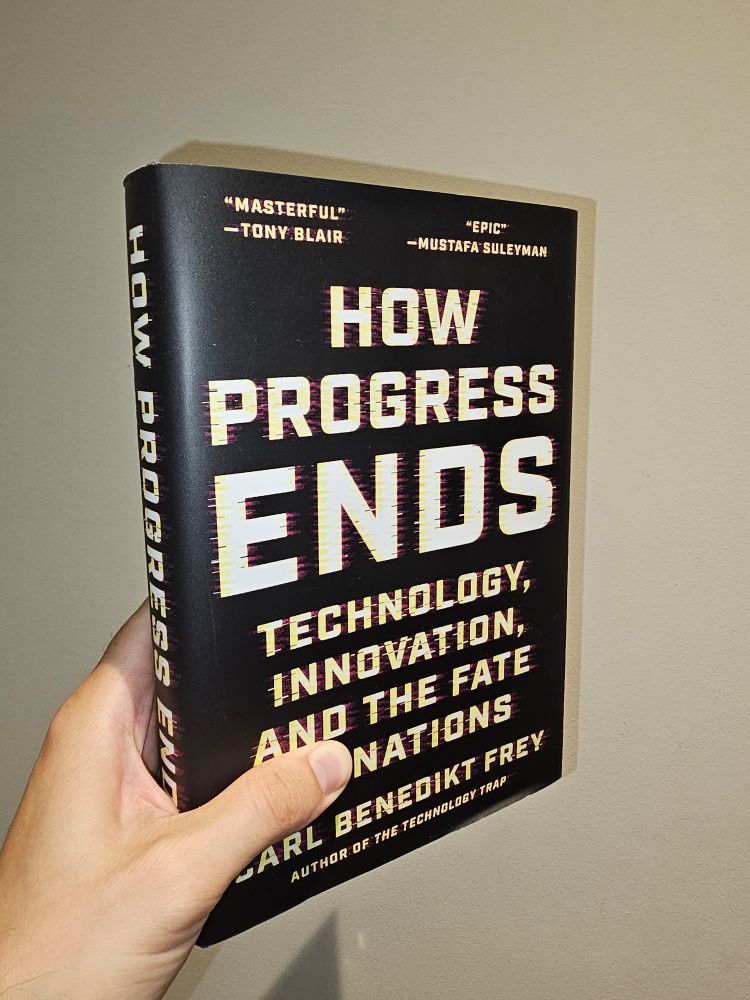
July 19, 2025 at 10:54 AM
Arrived in the post today. Holding it in your hands for the first time is always very special. Thank you @princetonupress.bsky.social !
My 5 cents against a popular myth:
Integration with China wasn’t the cause of America’s manufacturing decline—it was the response. The U.S. was already losing the manufacturing race to Japan. Chimerica neutralised Japan's production advantage.
In @theeconomistevents.bsky.social
Integration with China wasn’t the cause of America’s manufacturing decline—it was the response. The U.S. was already losing the manufacturing race to Japan. Chimerica neutralised Japan's production advantage.
In @theeconomistevents.bsky.social
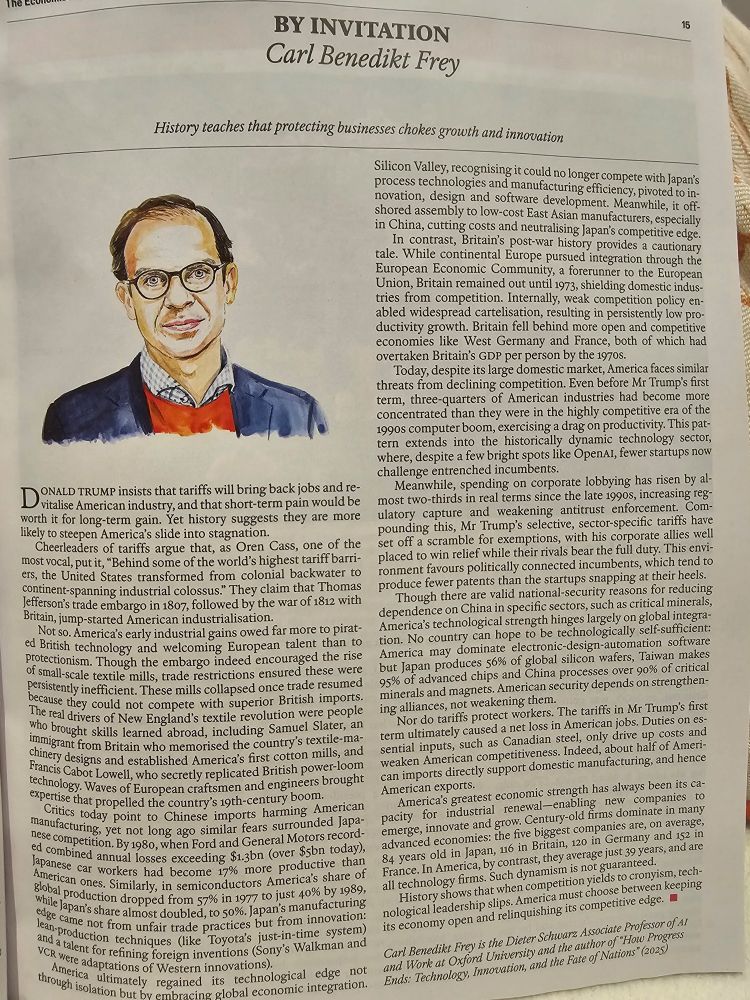
June 2, 2025 at 3:10 PM
My 5 cents against a popular myth:
Integration with China wasn’t the cause of America’s manufacturing decline—it was the response. The U.S. was already losing the manufacturing race to Japan. Chimerica neutralised Japan's production advantage.
In @theeconomistevents.bsky.social
Integration with China wasn’t the cause of America’s manufacturing decline—it was the response. The U.S. was already losing the manufacturing race to Japan. Chimerica neutralised Japan's production advantage.
In @theeconomistevents.bsky.social
American technological leadership rests on five pillars, and Trump’s policies are undermining all of them. My latest for @projectsyndicate.bsky.social

May 29, 2025 at 12:00 PM
American technological leadership rests on five pillars, and Trump’s policies are undermining all of them. My latest for @projectsyndicate.bsky.social
Why does progress stall—and what can we do about it?
Thrilled to announce that my new book, How Progress Ends: Technology, Innovation, and the Fate of Nations, will be published with @princetonupress.bsky.social on September 16, 2025.
Pre-order it here: hubs.ly/Q03hjRMr0
Thrilled to announce that my new book, How Progress Ends: Technology, Innovation, and the Fate of Nations, will be published with @princetonupress.bsky.social on September 16, 2025.
Pre-order it here: hubs.ly/Q03hjRMr0
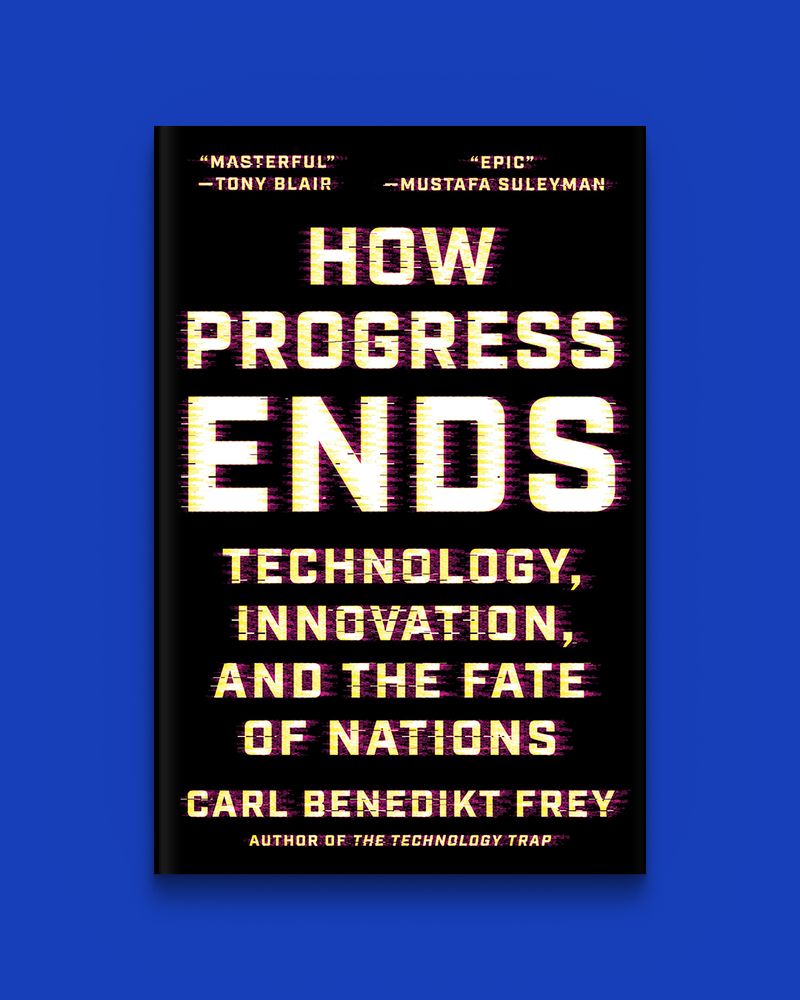
May 19, 2025 at 7:16 AM
Why does progress stall—and what can we do about it?
Thrilled to announce that my new book, How Progress Ends: Technology, Innovation, and the Fate of Nations, will be published with @princetonupress.bsky.social on September 16, 2025.
Pre-order it here: hubs.ly/Q03hjRMr0
Thrilled to announce that my new book, How Progress Ends: Technology, Innovation, and the Fate of Nations, will be published with @princetonupress.bsky.social on September 16, 2025.
Pre-order it here: hubs.ly/Q03hjRMr0
The IMF estimates internal EU barriers create costs equal to tariffs of about 110% on services—higher than Trump's "Liberation Day" tariffs on China—due to the EU adding regulations atop national rules.

May 15, 2025 at 3:00 PM
The IMF estimates internal EU barriers create costs equal to tariffs of about 110% on services—higher than Trump's "Liberation Day" tariffs on China—due to the EU adding regulations atop national rules.
New research across 7,000+ knowledge workers shows generative AI boosted solo-task efficiency but left collaborative work untouched: heavy users cut weekly email time by 3.6 hours (-31 %) and wrote documents a bit faster, while meeting hours stayed flat.
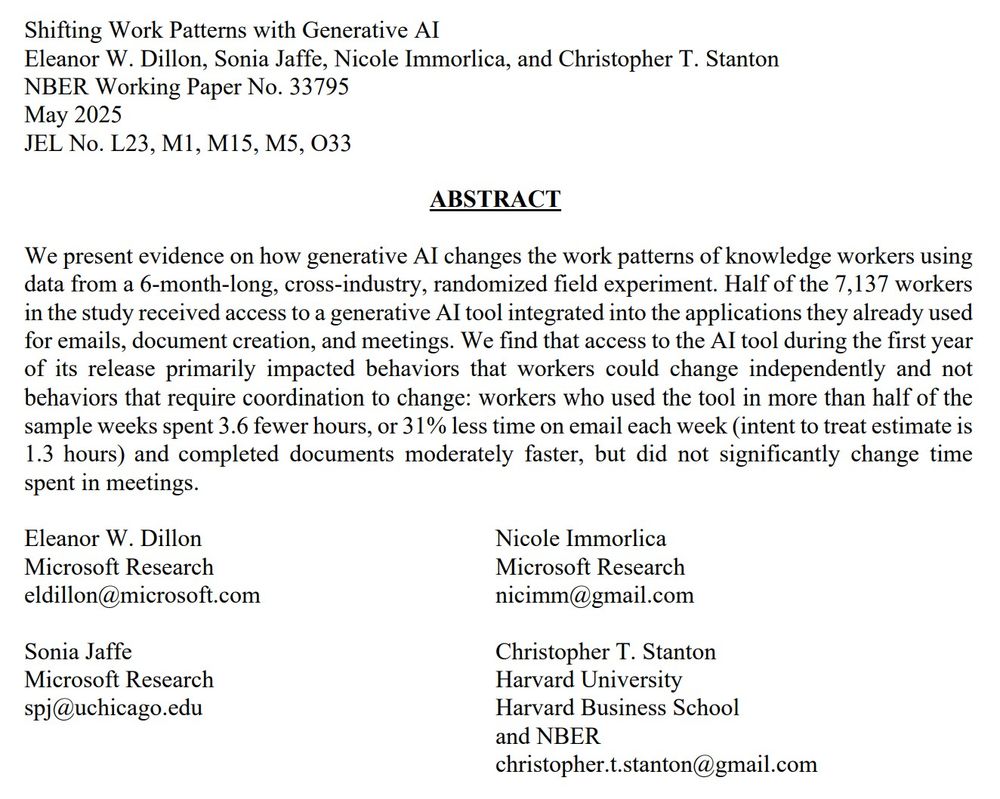
May 13, 2025 at 7:33 PM
New research across 7,000+ knowledge workers shows generative AI boosted solo-task efficiency but left collaborative work untouched: heavy users cut weekly email time by 3.6 hours (-31 %) and wrote documents a bit faster, while meeting hours stayed flat.
Political ties stifle innovation.
Firms in China that unexpectedly lost political patrons during anti-corruption purges (1999-2015) subsequently filed significantly more patents than similar firms that retained their connections
Firms in China that unexpectedly lost political patrons during anti-corruption purges (1999-2015) subsequently filed significantly more patents than similar firms that retained their connections

April 29, 2025 at 2:04 PM
Political ties stifle innovation.
Firms in China that unexpectedly lost political patrons during anti-corruption purges (1999-2015) subsequently filed significantly more patents than similar firms that retained their connections
Firms in China that unexpectedly lost political patrons during anti-corruption purges (1999-2015) subsequently filed significantly more patents than similar firms that retained their connections
In the medium-term, tariffs may prompt U.S. firms to automate more. But they are also making it more expensive to import robots which are largely made in China and Japan.

April 27, 2025 at 4:32 PM
In the medium-term, tariffs may prompt U.S. firms to automate more. But they are also making it more expensive to import robots which are largely made in China and Japan.
Do CEOs' political views shape business decisions?
As geopolitical tensions rise, US firms are increasingly “friendshoring”—redirecting imports toward ideologically aligned countries.
This effect is most pronounced in firms led by CEOs politically aligned with the sitting US administration.
As geopolitical tensions rise, US firms are increasingly “friendshoring”—redirecting imports toward ideologically aligned countries.
This effect is most pronounced in firms led by CEOs politically aligned with the sitting US administration.
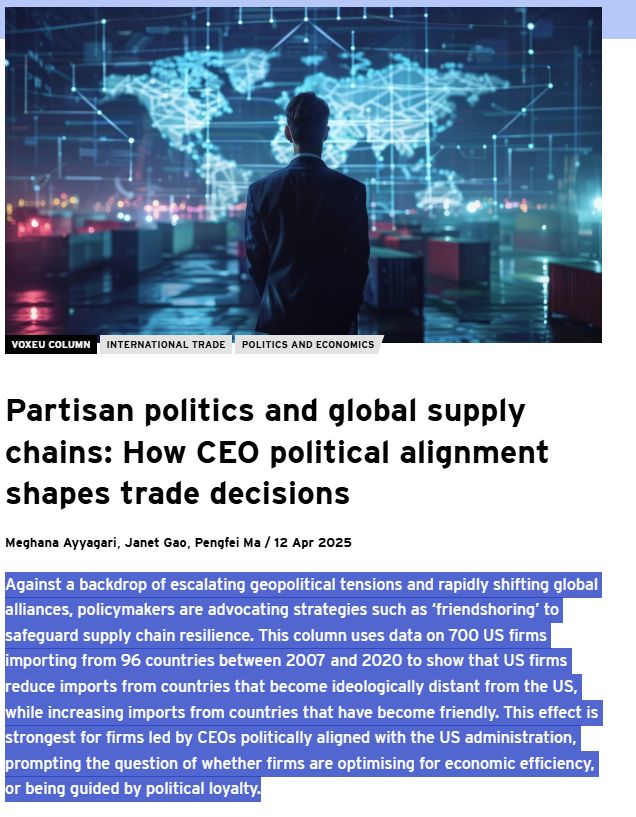
April 14, 2025 at 10:47 AM
Do CEOs' political views shape business decisions?
As geopolitical tensions rise, US firms are increasingly “friendshoring”—redirecting imports toward ideologically aligned countries.
This effect is most pronounced in firms led by CEOs politically aligned with the sitting US administration.
As geopolitical tensions rise, US firms are increasingly “friendshoring”—redirecting imports toward ideologically aligned countries.
This effect is most pronounced in firms led by CEOs politically aligned with the sitting US administration.
2/ But the U.S., heavily reliant on Chinese imports for essential goods like medicines, electronics, and critical minerals, risks severe harm by prematurely cutting trade. It's like entering a war without first securing ammunition—Trump’s approach provokes precisely the damage it aims to avoid.

April 12, 2025 at 10:27 AM
2/ But the U.S., heavily reliant on Chinese imports for essential goods like medicines, electronics, and critical minerals, risks severe harm by prematurely cutting trade. It's like entering a war without first securing ammunition—Trump’s approach provokes precisely the damage it aims to avoid.
Brilliant piece by the great @adamposen.bsky.social
on why the US will lose the trade war with China.
1/ China, as a surplus country, can more easily adapt by shifting sales domestically or elsewhere if trade with the U.S. declines.
on why the US will lose the trade war with China.
1/ China, as a surplus country, can more easily adapt by shifting sales domestically or elsewhere if trade with the U.S. declines.
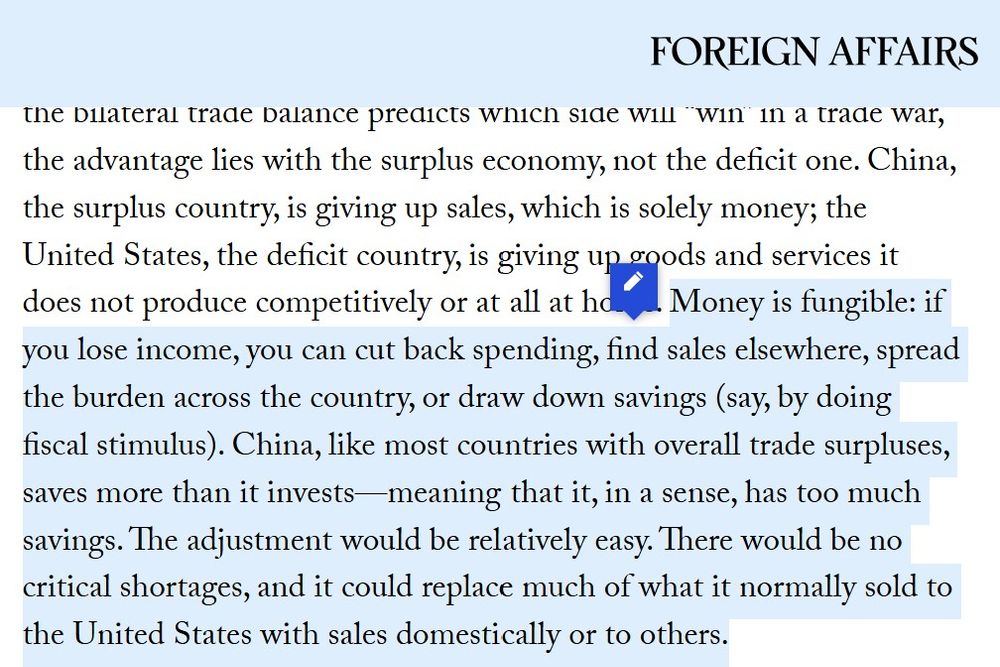
April 12, 2025 at 10:27 AM
Brilliant piece by the great @adamposen.bsky.social
on why the US will lose the trade war with China.
1/ China, as a surplus country, can more easily adapt by shifting sales domestically or elsewhere if trade with the U.S. declines.
on why the US will lose the trade war with China.
1/ China, as a surplus country, can more easily adapt by shifting sales domestically or elsewhere if trade with the U.S. declines.
We all know about the rising segregation by education in our cities. The same trend is unfolding at work as well. The college educated are becoming ever more detached from the realities of the rest.
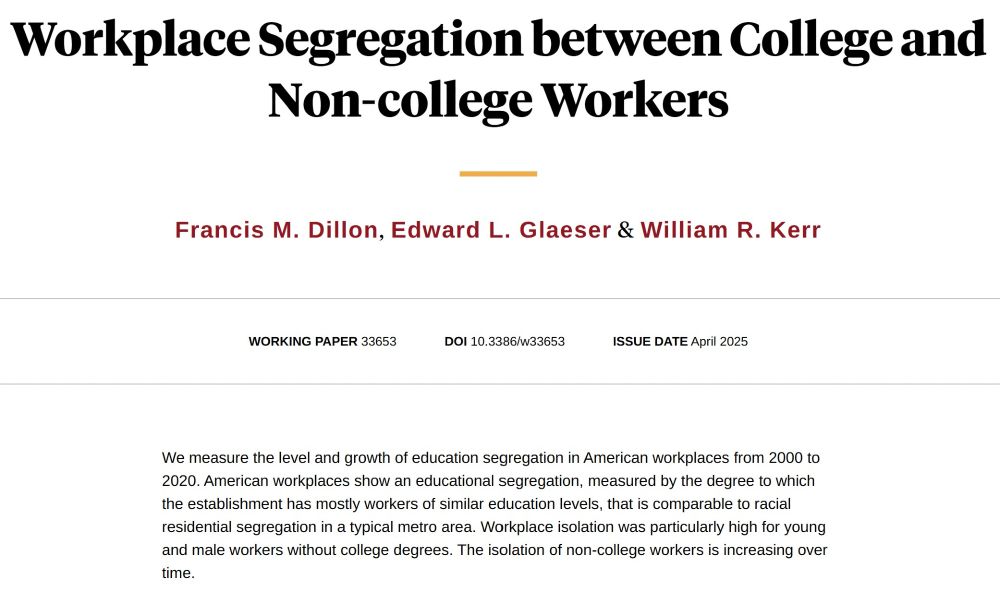
April 7, 2025 at 1:14 PM
We all know about the rising segregation by education in our cities. The same trend is unfolding at work as well. The college educated are becoming ever more detached from the realities of the rest.
As robots proliferate and jobs disappear, property crime rises (but not violent crime).
This study estimates $322 million additional national crime costs (2024 dollars) linked to robotics-induced job losses among low-skilled manufacturing workers.
This study estimates $322 million additional national crime costs (2024 dollars) linked to robotics-induced job losses among low-skilled manufacturing workers.

April 3, 2025 at 12:59 PM
As robots proliferate and jobs disappear, property crime rises (but not violent crime).
This study estimates $322 million additional national crime costs (2024 dollars) linked to robotics-induced job losses among low-skilled manufacturing workers.
This study estimates $322 million additional national crime costs (2024 dollars) linked to robotics-induced job losses among low-skilled manufacturing workers.
New study highlights China's state-led economy as strategic asset in trade war: Chinese state-owned firms cut US imports by extra 4% beyond tariffs—especially targeting agriculture & GOP regions. Tariff losses partially offset elsewhere; SOE cuts weren't.

March 28, 2025 at 10:30 AM
New study highlights China's state-led economy as strategic asset in trade war: Chinese state-owned firms cut US imports by extra 4% beyond tariffs—especially targeting agriculture & GOP regions. Tariff losses partially offset elsewhere; SOE cuts weren't.
This is the central dilemma facing many businesses today: while AI enables firms to cut junior staff and boost efficiency, it simultaneously jeopardizes their talent pipeline. If you're a law firm, you want a steady stream of potential future partners to chose from.

March 26, 2025 at 3:32 PM
This is the central dilemma facing many businesses today: while AI enables firms to cut junior staff and boost efficiency, it simultaneously jeopardizes their talent pipeline. If you're a law firm, you want a steady stream of potential future partners to chose from.
As open-source AI gains momentum, reducing the competitive advantage of foundational model providers, value creation increasingly migrates toward specialized applications built on top of these models.

March 25, 2025 at 10:05 AM
As open-source AI gains momentum, reducing the competitive advantage of foundational model providers, value creation increasingly migrates toward specialized applications built on top of these models.
The "China shock" has come to China
"Labour-intensive manufacturing is vanishing and millions of jobs could be lost, with repercussions for stability and growth"
"Labour-intensive manufacturing is vanishing and millions of jobs could be lost, with repercussions for stability and growth"
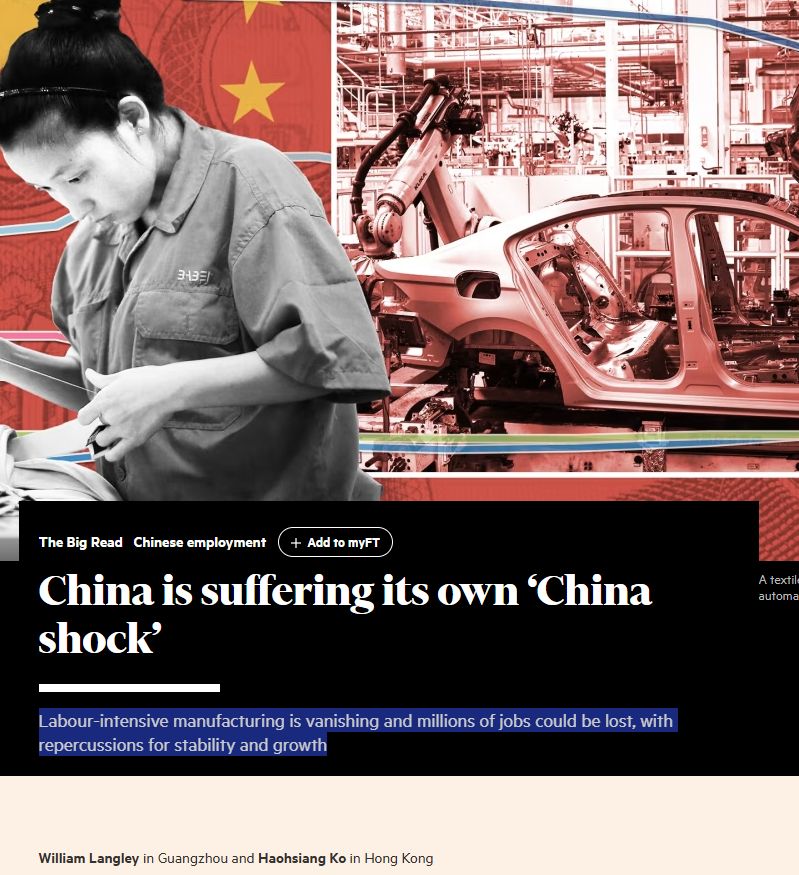
March 25, 2025 at 7:37 AM
The "China shock" has come to China
"Labour-intensive manufacturing is vanishing and millions of jobs could be lost, with repercussions for stability and growth"
"Labour-intensive manufacturing is vanishing and millions of jobs could be lost, with repercussions for stability and growth"
Will AI make learning foreign language less valuable?
In our new study, we analyze job postings data and find that machine translation technologies have significantly reduced the demand for foreign language skills—including Spanish, German, French, Japanese, and Chinese.
In our new study, we analyze job postings data and find that machine translation technologies have significantly reduced the demand for foreign language skills—including Spanish, German, French, Japanese, and Chinese.

March 24, 2025 at 2:01 PM
Will AI make learning foreign language less valuable?
In our new study, we analyze job postings data and find that machine translation technologies have significantly reduced the demand for foreign language skills—including Spanish, German, French, Japanese, and Chinese.
In our new study, we analyze job postings data and find that machine translation technologies have significantly reduced the demand for foreign language skills—including Spanish, German, French, Japanese, and Chinese.
My latest on how "virtual migration" (aided by Gen AI) that can counteract demographic decline and fuel economic growth. Link below:

March 13, 2025 at 12:00 PM
My latest on how "virtual migration" (aided by Gen AI) that can counteract demographic decline and fuel economic growth. Link below:
Enjoyed talking to the @FinancialTimes about how we use the time-savings from AI. That people allocate time saved to creative work seems right to me. But that creativity needs to result in the creation of new products and tasks 👇

March 7, 2025 at 1:48 PM
Enjoyed talking to the @FinancialTimes about how we use the time-savings from AI. That people allocate time saved to creative work seems right to me. But that creativity needs to result in the creation of new products and tasks 👇
AI = longer working hours + less leisure

March 5, 2025 at 10:41 AM
AI = longer working hours + less leisure
For academics to take risk, it needs to pay off. Sadly it does not. Risky NIH grants are renewed at much lower rates, especially in novel research areas & for early-career scientists.
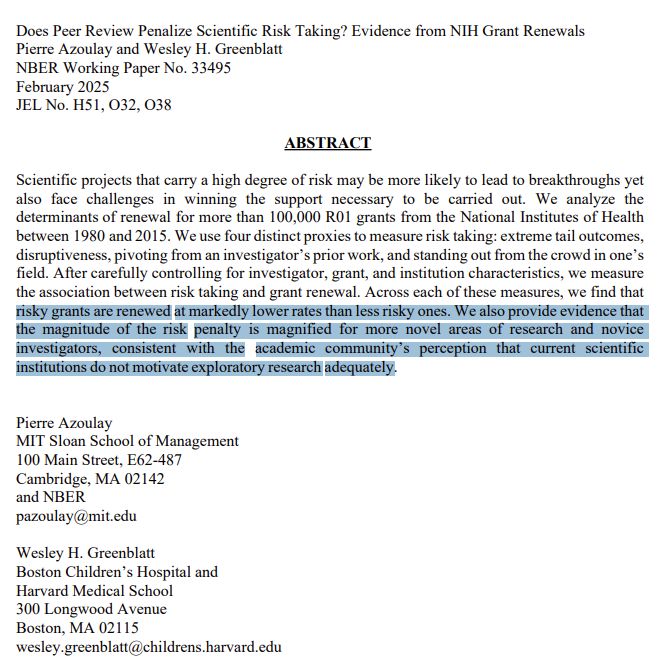
February 17, 2025 at 2:39 PM
For academics to take risk, it needs to pay off. Sadly it does not. Risky NIH grants are renewed at much lower rates, especially in novel research areas & for early-career scientists.
Not surprising but worrying: "higher confidence in GenAI is associated with less critical thinking"

February 12, 2025 at 3:46 PM
Not surprising but worrying: "higher confidence in GenAI is associated with less critical thinking"


